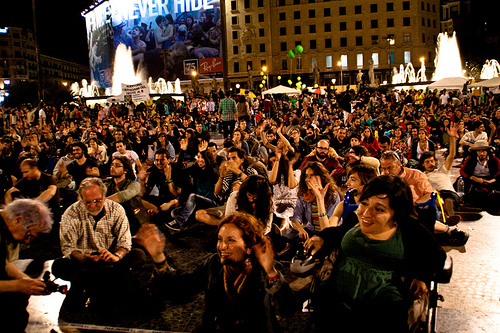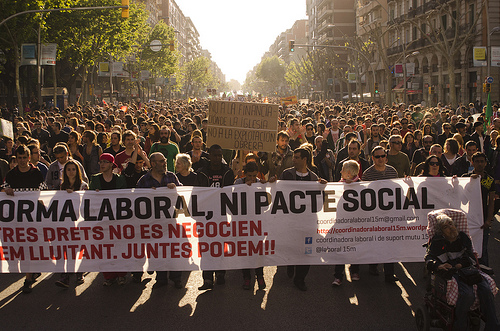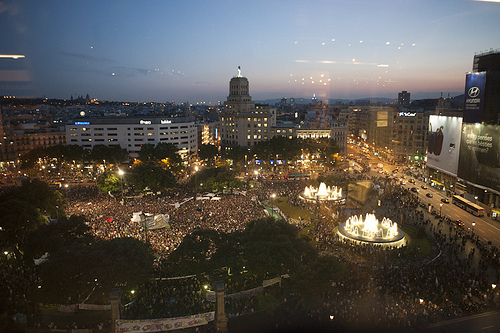12M: Barcelona once again becomes a revolutionary hub
- May 13, 2012
People & Protest
With the re-occupation of Plaça Catalunya, the movement in Barcelona once again finds itself on the front-line of a Global Spring of resistance.
- Author
In red, Brave Iberian Bride.
Barriochino’s lights are turning on.
(You) My sea-rider Spaniards and (you, my) Greeks
Greco and Lorca – Spain and Passionaria.From “Resistance”
Nikos Kavvadias*, 1910-1975
(Greek sailor-poet and writer)
May 12, 2012, Plaça Catalunya, Barcelona
Tens of thousands of Catalans took to the streets, responding to the call for a second global day of action after October 15.
“We demand, firmly but without violence: social justice, wealth distribution and an ethic of commons. We condemn poverty, inequality, environmental devastation and corruption as tools of subjugation by the powerful on society”, according to the 12-M website. And in a country with 24 percent unemployment (6 million people) and 50 percent youth unemployment, these demands seem more urgent than ever before.
Plaza Cataluña was again full of people: young, old, locals, foreigners, students, workers, pensioners, unemployed. It was no general strike, no 1st of May, no football victory celebration. No political party was involved in the mobilization and no trade union organized it.
 Yesterday, the indignados of Barcelona took back the square — symbol of their struggle. A struggle against — let’s say it openly — the dominant political and economic paradigm: representative democracy and capitalism. And they will stay there until the 15th of May, the anniversary of the movement — and who knows for how much longer.
Yesterday, the indignados of Barcelona took back the square — symbol of their struggle. A struggle against — let’s say it openly — the dominant political and economic paradigm: representative democracy and capitalism. And they will stay there until the 15th of May, the anniversary of the movement — and who knows for how much longer.
The movement that we watched being born last year in the squares of Tunisia, Egypt, Spain, Greece, and the US, is returning to its birthplaces to make its self-assessment, and decide on its next steps.
Will the leaderless movement that is based on popular assemblies, horizontal decision making processes, direct democracy and consensus; the movement that rejects the political party as an organizational form and representative democracy as an institutional practice; will it stay loyal to its ideals and try to bring about social change through building alternative, parallel institutions?
 Or would it try to achieve state power, and if so, how? Via the long parliamentary path, with all the necessary concession-making with the political establishment that it involves? Or via a shorter revolutionary path, which would bring it in direct confrontation with the state, and at risk of reproducing power, exchanging one form of domination over another? And finally, what would be the state’s reaction?
Or would it try to achieve state power, and if so, how? Via the long parliamentary path, with all the necessary concession-making with the political establishment that it involves? Or via a shorter revolutionary path, which would bring it in direct confrontation with the state, and at risk of reproducing power, exchanging one form of domination over another? And finally, what would be the state’s reaction?
“A ver”, as they say over here. Spring is coming, and it is going to be more interesting than ever before.
In March 2012, together with Jerome Roos we had the chance to interview Greek resistance hero and anti-austerity campaigner Manolis Glezos. And — referring to the occupation of Syntagma Square — he told us that an occupation of a square is not really direct democracy itself; it is a lesson in direct democracy.
Last year, the indignados had their first empirical lesson in direct democracy and they passed it successfully. And today, they’ve just entered the second semester.
Source URL — https://roarmag.org/essays/acampada-barcelona-12-m-indignados/


